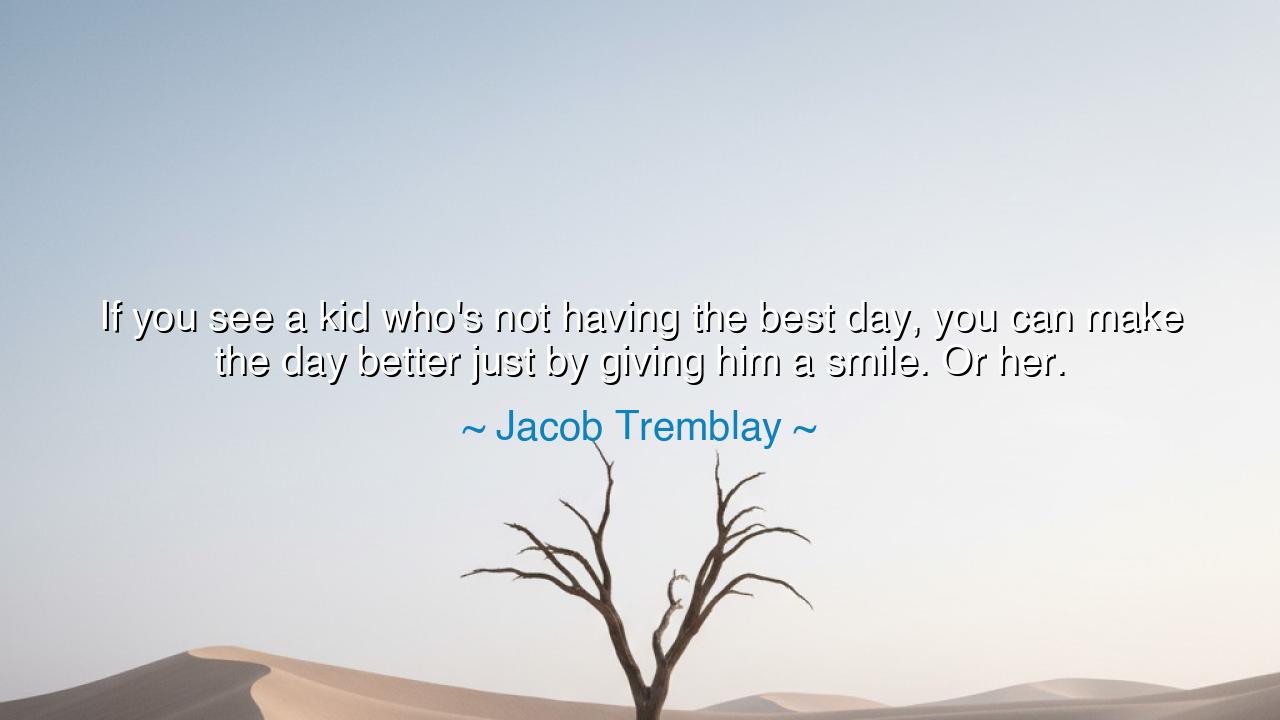
If you see a kid who's not having the best day, you can make the
If you see a kid who's not having the best day, you can make the day better just by giving him a smile. Or her.






The words of Jacob Tremblay, though spoken by one so young, carry the weight of timeless truth: “If you see a kid who’s not having the best day, you can make the day better just by giving him a smile. Or her.” These are not merely gentle thoughts, but wisdom clothed in simplicity. They remind us that the greatest acts of kindness are often the smallest, that a mere smile can be a balm to the wounded heart, a spark to reignite hope, and a light to scatter shadows.
For the heart of a child is tender, and the burdens of the world weigh more heavily upon it than we may know. A word too harsh, a loneliness too deep, or a moment of rejection can leave invisible scars. Yet within that same heart lies the power to be healed by gestures so simple that many dismiss them. A smile—sincere, unguarded, filled with warmth—is one such gesture. It says without words: “I see you, I care for you, you are not alone.” To offer this gift is to become, if only for a moment, a guardian of another’s spirit.
History itself testifies to the power of such small acts. Consider the story of Mother Teresa in the streets of Calcutta. She often spoke of how even the poorest of the poor, starved of bread and home, were hungrier for love and recognition than for food itself. She taught her followers that a smile, given freely, could restore dignity to one who felt forgotten. It was never only the medicine she carried, nor the bread she offered, but the radiance of her smile that healed souls. Jacob’s words, in their youthful clarity, echo the same lesson: that even a child can give what the world most desperately needs.
And yet, how often do we pass by others without lifting our eyes, without acknowledging their existence? The world, busy with its pursuits, forgets that to be unseen is to be diminished. To smile at another is to grant them presence, to say, “You matter.” This is especially true for children, who, in their innocence, seek signs that they belong, that they are cherished. One smile may change the course of their day, and perhaps the direction of their life.
But let us not think this truth belongs only to children. It belongs to all of us. For within every man and woman lies the child who once longed for kindness. Within each heart still lingers the need for recognition, the need to be seen and uplifted. Thus, when you give your smile freely, you are not merely offering courtesy—you are planting hope, reviving courage, and strengthening the unseen bonds that hold humanity together.
The lesson, then, is clear: never underestimate the power of small kindnesses. You may not have wealth to give, nor wisdom to speak, nor power to command—but you have your smile, and it is enough. Use it as a lantern in the dark corridors of another’s life. Offer it especially to children, whose spirits are still being shaped, and who will remember long after the moment has passed that someone saw them and cared.
In practice, let this be your daily discipline: when you meet eyes with another, let warmth rise to your lips. When you see a child weighed down by sorrow, gift them the radiance of your smile. When you encounter strangers, do not withhold the light of recognition. For you may not know the battles they fight, but your small gesture may be the turning of the tide.
Thus, remember and carry forward the wisdom of Jacob Tremblay: a smile, though small, can heal wounds unseen. It costs nothing, yet it may save a soul. It takes but a moment, yet its ripples may endure for a lifetime. So let your smile be not rare but abundant, not hesitant but generous. In this way, you will not only brighten your own path, but light the way for countless others who walk beside you in the great journey of life.






AAdministratorAdministrator
Welcome, honored guests. Please leave a comment, we will respond soon